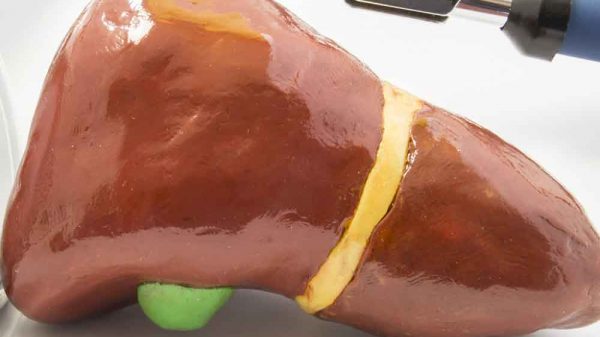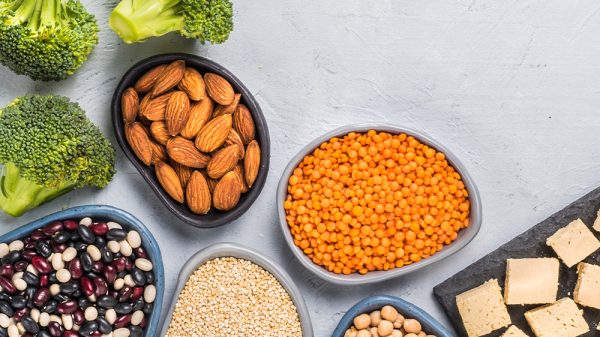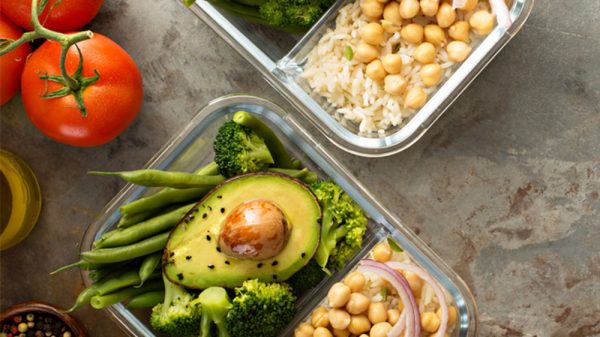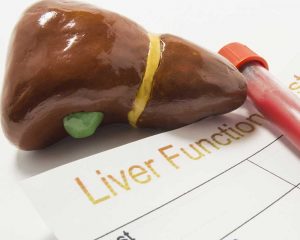Diet is a critical factor when it comes to preventing and reversing nonalcoholic fatty liver disease. To maintain a healthy liver and reverse fat build-up, there are certain foods you should avoid. So, what foods can damage your liver? Steer clear of these 8 foods bad for liver health to support liver healing.
1. Soda
Soda is a major source of sugar in the American diet. Just one can of soda contains upwards of 40 grams of added sugar when the recommended daily intake is no more than 10 grams. Consuming high amounts of sugar takes a toll on the entire body, including the liver.
What happens when we drink soda? When we drink soda, the glucose from the added sugar is rapidly absorbed into the bloodstream, causing blood glucose levels to skyrocket. In response, the pancreas releases insulin, a signaling hormone that allows cells to collect glucose from the bloodstream.
Muscle cells, brain cells, and other organ cells throughout the body utilize some of the sugar, since a certain amount of glucose is vital for producing energy and powering biological functions. However, because so much excess glucose is present in the blood, most of the sugar is turned into fat to be stored throughout the body. Drinking lots of soda over time causes the pancreas to work very hard to constantly produce and release insulin, which can lead to insulin resistance and type 2 diabetes. Drinking too many soft drinks also contributes to obesity and high blood pressure. All of these metabolic conditions are associated with fatty liver disease.
Moreover, drinking soda in and of itself appears to raise the likelihood of developing fatty liver disease, aside from its contribution to associated risk factors. A study published in the Canadian Journal of Gastroenterology discovered that soda consumption alone increased the risk of developing fatty liver disease. Most interestingly, the study revealed that soda consumption increased fatty liver risk independent of traditional risk factors like diabetes, obesity, and high cholesterol. (1)
Healthy Alternatives
If you’re craving something sweet, stick to natural sugars found in whole fruits. Whole fruits contain sugar that’s combined with fiber, antioxidants, and vitamins. The fiber present in whole fruits effectively slows down the absorption of sugar into the bloodstream and prevents blood sugar spikes. To get a sugar fix without the harmful impacts of added sugars, snack on fruits like blueberries, cherries, oranges, papaya, kiwi, mango, pomegranate, pineapple, strawberries, and watermelon.
2. Bacon
Bacon and other processed meats have negative consequences for liver health. The preservatives added to bacon – like salt and artificial nitrates and nitrites – are detrimental for your health.
The salt added to bacon contributes to high blood pressure, a common co-occurring condition with fatty liver disease and metabolic syndrome. Excess salt, in addition to causing high blood, may also play a direct role in liver damage. A study published in the Journal of Agricultural and Food Chemistry found that excess salt exposure increased the rate of liver cell death and led to the production of free oxidative species that cause liver inflammation. This research suggests that excessive consumption of salt may cause oxidative stress and exacerbate liver damage in conditions like fatty liver disease. (2)
Artificial nitrates and nitrites preserve the color and texture in meats such as bacon. However, artificial nitrates and nitrites are embedded in meat proteins that cause a reaction during heat exposure. When bacon is cooked, the preservatives react with pork protein to produce harmful compounds called nitrosamines. Nitrosamines are cancer-causing agents that also cause inflammation and oxidative stress in the liver.
The preservatives present in bacon aren’t the only factors that have consequences for liver health. Bacon is a particularly fatty cut of meat. The marbled white fat that is found throughout bacon strips is saturated fat, which is a major contributor to weight gain, metabolic conditions, and cardiovascular disease. In turn, this increases the chances of developing fatty liver disease.
Other processed meats to avoid include canned meats, red meat, salami, pepperoni, sliced deli meats, sausage, and hot dogs.
Healthy Alternatives
If you are looking for protein without the detrimental preservatives, sodium, and saturated fat, choose grass-fed lean meats and fatty fish. Small portions of fresh chicken breast and turkey breast provide all essential amino acids without the unhealthy fats. Fatty fish like salmon, mackerel, and sardines are packed with omega-3 fatty acids, a highly nutritious fat that supports liver function and quells inflammation associated with fatty liver disease.
3. Some Canned Foods
Canned foods are very convenient since they have a long shelf-life, but it’s important to choose the right kinds of canned foods for your health. Some canned food contains high amounts of sodium and added sugars, which contribute to weight gain, high blood pressure, insulin resistance, type 2 diabetes, and fatty liver disease.
In addition, some canned food items contain a chemical called bisphenol-A (BPA). BPA has been shown to impact hormonal health, but newer research reveals that BPA may also play a role in liver health. A study conducted by researchers at the Division of Pediatric Gastroenterology, Hepatology, and Nutrition at the University of California San Francisco examined the relationship between BPA consumption and nonalcoholic fatty liver disease for adolescents. Results found that BPA intake among adolescents – particularly Hispanic adolescents – is associated with a higher risk of developing fatty liver disease. (3)
To protect your liver, make sure to look for canned foods that are low in sodium and low in sugar. It’s also important to choose brands that produce cans that are free of BPA.
Healthy Alternatives
As often as possible, go for fresh foods like fruits, vegetables, nuts, seeds, and beans. These fresh foods are filled with micronutrients and macronutrients like vitamin C, vitamin E, healthy fats, fiber, and protein that help you fight against fatty liver disease and reduce the amount of fat in the liver. Examples of fresh plant-based foods that promote liver health include avocados, blueberries, cranberries, oranges, kale, broccoli, brussels sprouts, cauliflower, flaxseeds, chia seeds, walnuts, and pumpkin seeds. Fresh fruits and veggies have the added benefits of fighting against risk factors associated with fatty liver disease, like insulin resistance, type 2 diabetes, high blood pressure, and obesity.
4. White Bread
Processed, refined grains like white bread often contain added sugar and are biologically equivalent to sugar in the body – a double whammy when it comes to fatty liver disease. White bread is made from refined wheat that has had essentially all nutritional value removed, leaving only the starchy product behind. The industrial refinement of starches results in a bread that might be softer and tastier but is also much less healthy.
When we eat starch removed from the fiber, vitamins, minerals, protein, and antioxidants it is naturally bundled with, the body handles the carbohydrates just as it would handle sugar. The carbohydrates in white bread are simple carbohydrates and are rapidly broken down into sugar that is released into the bloodstream. Just like the chronic consumption of soda, eating too much white bread over time contributes to insulin resistance, type 2 diabetes, weight gain, and fatty liver disease. On top of that, white bread often contains added sugars as well.
Other foods similar to white bread that should be avoided are white rice, white pasta, cookies, crackers, chips, and baked goods.
Healthy Substitutes
You can still eat carbs when you have fatty liver disease, you just want to make sure that you choose the right ones! Instead of processed, refined carbs, choose whole-grain, spouted versions. Whole-grain bread, sprouted brown rice, quinoa, whole-grain buckwheat pasta, and rolled oats are excellent substitutes for your favorite carb-heavy dishes. Plus, whole-grain carbohydrates are filled with fiber that promotes gut health, weight loss, and liver health. Sprouted whole-grain products are usually packed with even more antioxidants, fiber, and essential amino acids than plain whole-grain products.
5. Ice Cream and Full-Fat Dairy
Ice cream is a dairy product filled with added sugars and saturated fat, both of which contribute to fatty liver disease and associated risk factors. The excess consumption of saturated fat is a major contributor to weight gain, metabolic syndrome, cardiovascular disease, and fatty liver disease. Saturated fat impairs insulin function and contributes to insulin resistance and diabetes. Excess saturated fat intake also increases cholesterol and triglycerides, which can lead to the build of arterial plaques that obstruct blood flow.
Other dairy products to stay away from if you have fatty liver disease include full-fat cheese, milk, cream, butter, and yogurt.
Healthy Substitutes
If you’re craving something fatty, stick to healthy fat options like nuts, seeds, fatty fish, and certain oils like olive oil. Avocado is a healthy, fatty substitute that works well as a topping for toast or a creamy addition to smoothies and shakes. Plus, phytosterols found in many plant-based fats have been shown to lower cholesterol and fight against metabolic risk factors associated with fatty liver disease. You can also go for small portions of nonfat, low-sugar dairy products like yogurt, which contains all essential amino acids without unhealthy fats.
6. French Fries
French fries and other fried foods contain trans fats, which is the worst type of dietary fat for you. Trans fat is a type of fat formed through industrial processes. Research published in Nutrition & Metabolism found that feeding trans fats to animal models increased inflammation and compromised liver function. (4)
Examples of other products that could contain trans fats include fried chicken, baked goods, frozen meals, fast food, and packaged snacks like chips and cookies.
Healthy Substitutes
A direct substitute for fast food French fries is homemade sweet potato fries. Simply cut a sweet potato into wedges and coat lightly in avocado oil, chili powder, paprika, and garlic powder. Bake until browned and serve. Sweet potatoes are filled with beta carotene, vitamin C, fiber, and potassium to help lower inflammation and promote liver repair. If you’re craving something crunchy and fried, try to satisfy your craving with crunchy homemade kale chips and beet chips.
7. MSG
Though not a food per se, monosodium glutamate (MSG) is a preservative that is found in a variety of foods. Foods high in MSG tend to be processed and packaged items that are also high in sodium, saturated fat, trans fat, added sugar, and/or other preservatives.
MSG may enhance the flavor of some foods, but research shows that MSG may play a role in nonalcoholic fatty liver disease. A study published in The Journal of Lipid Research assessed the impact of MSG on mice with nonalcoholic fatty liver disease. Results showed that mice treated with MSG increased liver inflammation and fat accumulation. (5)
To avoid MSG, steer clear of fast food and packaged foods. When possible, check the ingredients label to make sure MSG is not included.
Healthy Alternatives
If you’re craving the flavor of take-out or restaurant food, the key to satisfying your craving is amplifying the seasoning in your food. Go heavy with all of the seasonings that you like, which may include garlic powder, red pepper flakes, turmeric, curry, cumin, oregano, thyme, and basil. Micronutrients present in all of these seasonings have antioxidant properties and protect against liver damage and help reverse fatty liver disease. Use seasonings and spices in abundance, but just be careful with salt. Too much sodium worsens high blood pressure and contributes to metabolic dysfunction.
8. Alcohol
Alcohol certainly plays a role in alcohol-induced fatty liver disease, but it also contributes to nonalcoholic fatty liver disease as well. Alcohol is metabolized in the liver, where liver enzymes break down alcohol into acetaldehyde, which is then converted to acetate. Acetaldehyde is a toxic compound that causes oxidative stress and inflammatory damage in the liver, contributing significantly to fat accumulation in liver tissues. Alcohol metabolism also produces free radicals that damage liver cells.
Adding alcohol to a diet high in added sugars, saturated fat, trans fat, sodium, and preservatives can be equated to adding fuel to a fire. Even if consumed in moderation, alcohol requires your liver to work harder and contributes to extra damage and inflammation. To promote liver health and healing, it’s best to eliminate all forms of alcohol, including beer, wine, and spirits.
Swap Alcohol for Liver-Friendly Drinks
Instead of alcohol, stick to water and green tea. Drinking plenty of water helps the body flush out toxins, increases blood flow, and helps metabolic processes function smoothly. Adding freshly brewed green tea to your daily routine will also promote liver health. Green tea leaves are filled with antioxidant agents like EGCG that scavenge damaging free radicals in the liver and promote healthy liver function while preventing disease progression. Cutting out alcohol and replacing it with healthy drinks like water or unsweetened green tea will also help you reach a healthy body weight.
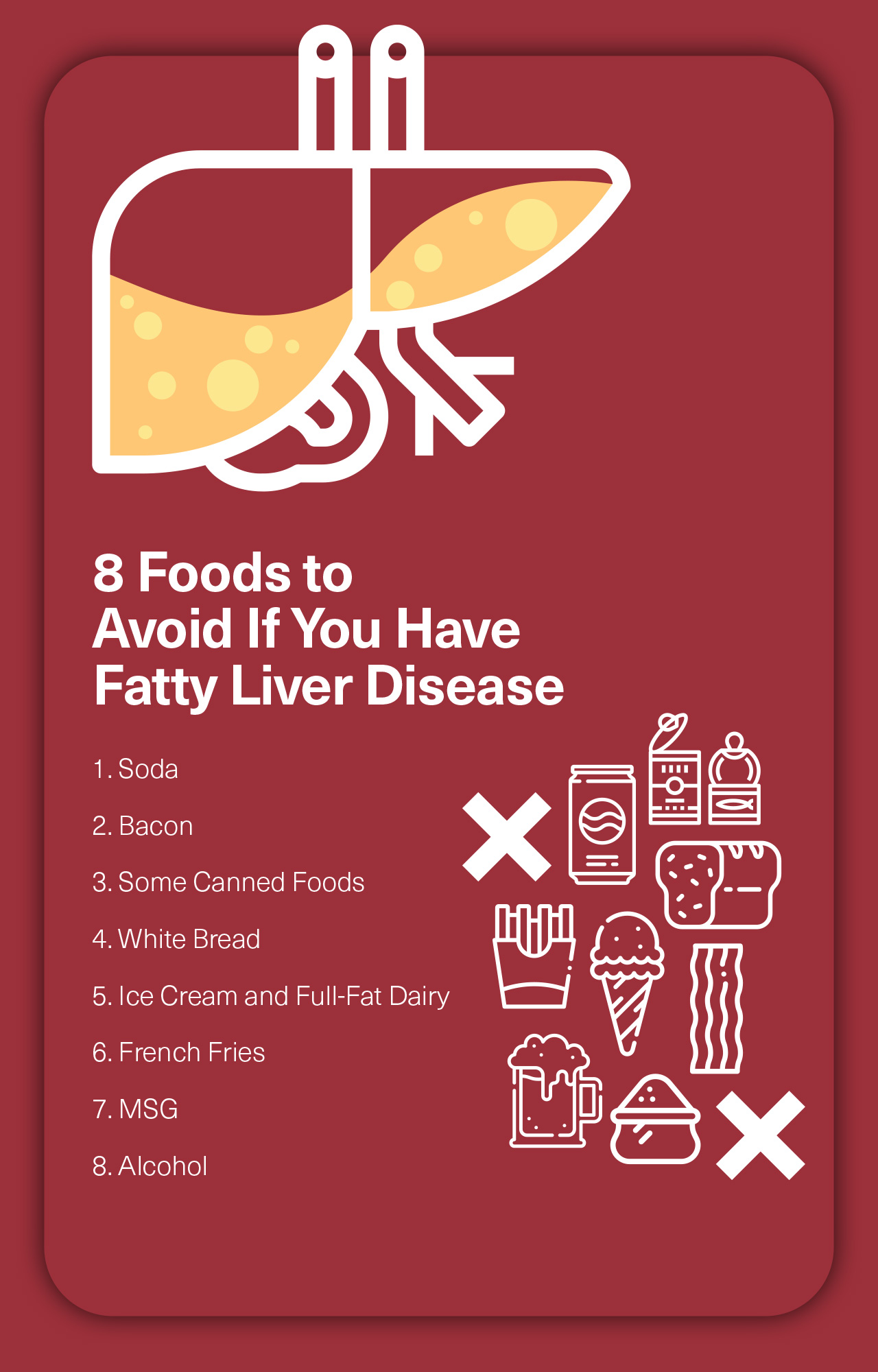
Conclusion
Getting rid of all of the above foods and adding in liver-friendly foods will help your body repair liver damage, reverse fatty liver disease, and prevent the potential progression to steatohepatitis, liver cirrhosis, liver cancer, and liver failure.
Foods to avoid with liver disease include bacon, canned foods, white bread, ice cream, French fries, soda, and alcohol, as well as other foods high in preservatives, saturated and trans fats, added sugars, chemicals, and refined carbs. Instead, stick to foods good for liver regeneration, like veggies, fruits, whole grains, legumes, and high-quality proteins full of essential amino acids.
References:
(1) https://www.ncbi.nlm.nih.gov/pmc/articles/PMC2661299/
(2) https://www.ncbi.nlm.nih.gov/pubmed/26843032
(3) https://www.ncbi.nlm.nih.gov/pmc/articles/PMC5796302/
